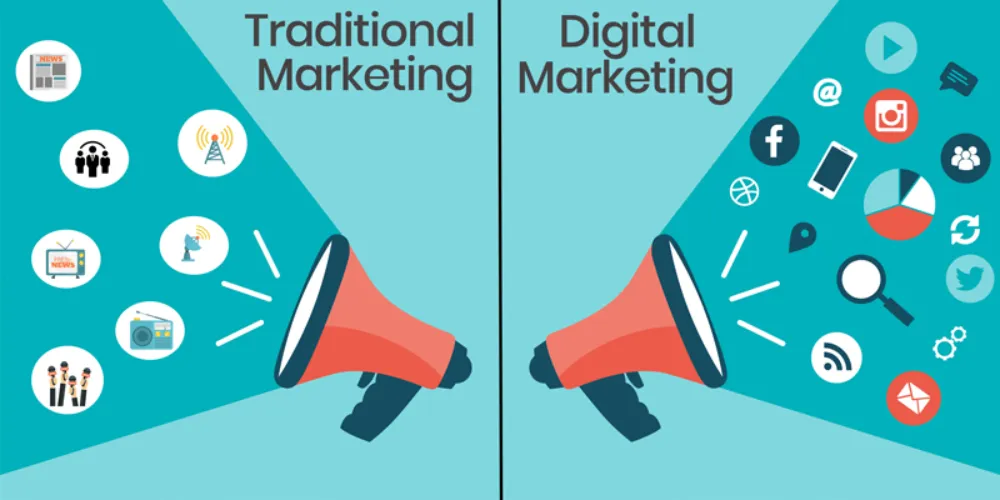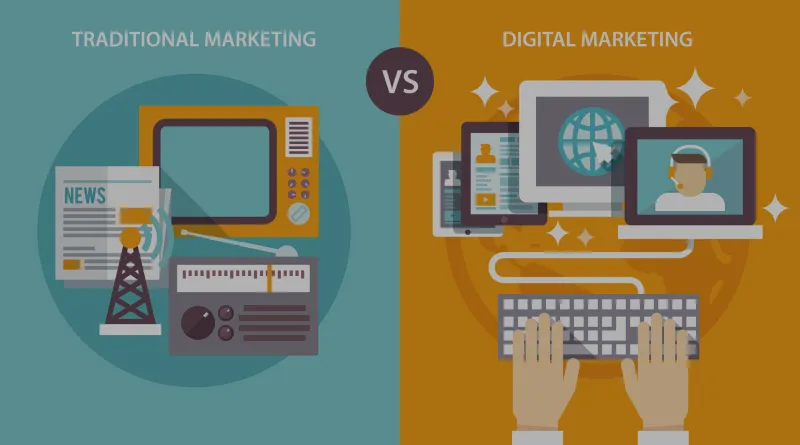Digital Marketing vs. Traditional Marketing: Which Drives Better Growth?
Marketing in the contemporary dynamic business world has shifted beyond the mere word-of-mouth marketing and print advertisement to a multi-faceted strategy that involves the use of data to reach the market across the world. To any business owner who is operating in a competitive city such as Mumbai it may be hard to decide whether to do digital marketing or traditional marketing.
They both seek to relate the brands with consumers although their means, cost, scope, and performance vary in a tremendous way. This paper will discuss the ways each of them works, the importance of digital marketing, digital marketing strategies and how collaborating with the digital marketing company in Mumbai such as Web Techneeq would enable your business to succeed.
Understanding Traditional Marketing
Traditional marketing involves all of the promotion means that have existed prior to the internet age. These are the traditional mediums that most of the people were used to like:
- Advertisements in newspapers/magazines.
- TV and radio advertising.
- Billboards and outdoor hoardings.
- Fliers, pamphlets, and brochures.
- Direct mail campaigns
- In-person and sponsorships.
These means are physical, comprehensible, and remain useful even in accessing the audiences favoring the physical media. The brand can be remembered forever on a large road billboard or on a catchy radio commercial.
Traditional marketing is not without limitations though. It is usually costly, immeasurable and not flexible. For example, it is almost impossible to make any changes or gauge direct contact once a print advertisement has been released, or a TV commercial has been broadcasted. Besides, the audience targeting is wide which may result in wastage of exposure.
What Is Digital Marketing?
Digital marketing is any activity that involves online promotion of a brand, product or service through digital medium. It uses technology and data analytics to target certain audiences with quantifiable accuracy.
The common forms of digital marketing are:
- Search Engine Optimization (SEO)
- Pay-perClick Advertising (PPC)
- Social Media Marketing
- Email Campaigns
- Blogs, videos, infographics.
- Influencer and Affiliate Marketing.
- Website SEO and Measuring.
Digital marketing is based on real time unlike traditional marketing. Through social media, emailing, and targeted advertising, this will establish a two-way communication between the brand and the customers. Moreover, all clicks, views, and conversions can be monitored – and the performance can be ordered to measure and promote the results.
Key Differences Between Digital and Traditional Marketing
| Aspect | Traditional Marketing | Digital Marketing |
|---|---|---|
| Medium | Print, TV, radio, outdoor | Internet, social media, search engines |
| Reach | Local or regional | Global and targeted |
| Cost | High production and distribution costs | Cost-effective and scalable |
| Analytics | Difficult to measure accurately | Real-time data and metrics |
| Interactivity | One-way communication | Two-way engagement |
| Flexibility | Limited, changes take time | Instant updates and testing |
| Personalization | Same message for all | Highly targeted and personalized |
| Speed | Slow execution | Quick campaign setup and adjustments |
The modern consumer prefers convenience and personalization. This shift toward digital lifestyles has made digital marketing a vital tool for every business looking to stay competitive.
The Importance of Digital Marketing
Digital marketing is important because it can provide cost effective, targeted and quantifiable campaigns. This is the reason why it should be essential today:
1. Global and Local Reach
Digital channels help your company to access potential buyers wherever they are in the globe. Simultaneously, local search engine optimization and advertisements can be used to focus on particular areas or cities, a strength not only of small and medium-sized businesses.
2. Cost Efficiency
Digital marketing consumes less funds as compared to traditional advertising. Social media or Google ad campaigns can be conducted with flexible expenses and change courses of actions according to the outcomes.
3. Measurable Results
All the features of a digital campaign could be monitored impressions, clicks, conversions and ROI. Companies are able to make evidence-based decisions rather than make them on guess work.
4. Real-Time Engagement
Digital advertisements and social media enable the brands to connect with their customers in real-time. Trust and loyalty get created through interaction whether comments, direct messages as well as polls.
5. Precise Targeting
Using digital tools will enable you to target the audiences in terms of their demographics, location, behavior and interests. This is so that you reach out to people who can change.
6. Adaptability
As opposed to the old methods of campaigns which require weeks to alter, online marketing initiatives can be adjusted immediately. Such flexibility assists companies to remain relevant and in touch with market trends.
7. Higher ROI
Digital marketing plans have a tendency of giving a higher ROI when implemented right. Due to the continuous analysis and optimization, the campaigns are becoming more efficient with time.
Digital marketing has a definite advantage over traditional marketing since it can be measured, analyzed, and changed in real time.

Key Digital Marketing Strategies That Work
The combination of time-tested strategies can help you to take full advantage of your online presence. Here are the core pillars:
1. Search Engine Optimization (SEO)
SEO makes your website high in the search results which make potential customers know you naturally. It involves optimization of content, structure, keywords, and back links of the website.
2. Content Marketing
Good content mentions blogs, videos, infographics, etc., which inform and buy readership. Recurring material is also useful in SEO and branding your brand as an authority to be trusted.
3. Pay-Per-Click Advertisement (PPC)
PPC programs are fast to achieve with paid advertisements that are placed on social networks or search engines. No more spending money, you pay when someone will use your advertisement.
4. Social Media Marketing
Social media are used to develop brand identity and reach directly to customers. The ability of Instagram, Facebook, and LinkedIn to personalize brands enables companies to portray their entrepreneurial spirits, distribute deals, and receive reviews.
5. Email Marketing
Through this, it ranks as one of the best methods to grow leads and hold customers. Customized value-based emails have the potential to boost interest and turnovers.
6. Analytics and Data Tracking
Analytics monitoring assists in pointing out what is working or not. Measuring such metrics as conversion rates and the number of clicks is also a guarantee that you will be on the right course.
Through a combination of these online marketing methods, the companies will be able to establish a steady online presence that will push the companies to grow in measurable ways.
When Traditional Marketing Still Works
Although there has been an increase in digital marketing, there is still a position of traditional marketing. The use of physical adverts, the use of print media and television can bring about credibility and may reach those who might not be online as often.
To illustrate, a billboard campaign in major roads of Mumbai can be used to support your online advertisement by creating brand recall. A hybrid solution that consists of combining digital and traditional means of action is an ideal solution that a majority of companies should pursue.
Partnering with a Digital Marketing Company in Mumbai
Depending on the use of several channels of marketing, businesses tend to do it with difficulty. The right place to include a Mumbai based digital marketing firm such as Web Techneeq.
How Web Techneeq Can Help:
- Strategic Planning: This is the process of figuring out where you want to go and who you want to reach in order to develop a specific marketing roadmap.
- SEO and Content: Make your site search engine friendly and come up with good content that is interesting and valuable.
- Paid Campaigns: How to manage PPC and social ads to get the best ROI.
- Social Media Management: Engaging your brand and social group.
- Performance Analysis: This is continuous reporting and monitoring of results that can be measured.
By collaborating with a team of professionals such as Web Techneeq, your brand will never be forgotten, out of the market, or not up to date with the current technology of the digital world.
Digital Marketing vs. Traditional Marketing: Which Is Right for You?
These two types of marketing are strong. Traditional marketing is more credible and it has tangible exposure whereas digital marketing receives quantifiable information, flexibility and targeting.
But in a world that is going online and on the other hand, overlooking online channels can spell out a great number of opportunities to be missed. The optimal plan frequently incorporates both- old fashioned to raise the brand awareness, and online to drive sales and involvement.
Conclusion
There is no comparison between digital marketing and traditional marketing, it is just a matter of what action is more appropriate to your audience and objectives. Nevertheless, in the era of customer living, working, and shopping online, the value of digital marketing cannot be overrated.
To grow businesses, a robust digital presence is no longer a matter of choice anymore. The collaboration with an established digital marketing company in Mumbai, such as Web Techneeq will also introduce you to the experience, imagination, and planning essential to promote your brand in a digital-only world.
Disclaimer
The information presented in this blog is derived from publicly available sources for general use, including any cited references. While we strive to mention credible sources whenever possible, Digital Marketing Company in Mumbai does not guarantee the accuracy of the information provided in any way. This article is intended solely for general informational purposes. It should be understood that it does not constitute legal advice and does not aim to serve as such. If any individual(s) make decisions based on the information in this article without verifying the facts, we explicitly reject any liability that may arise as a result. We recommend that readers seek separate guidance regarding any specific information provided here.

